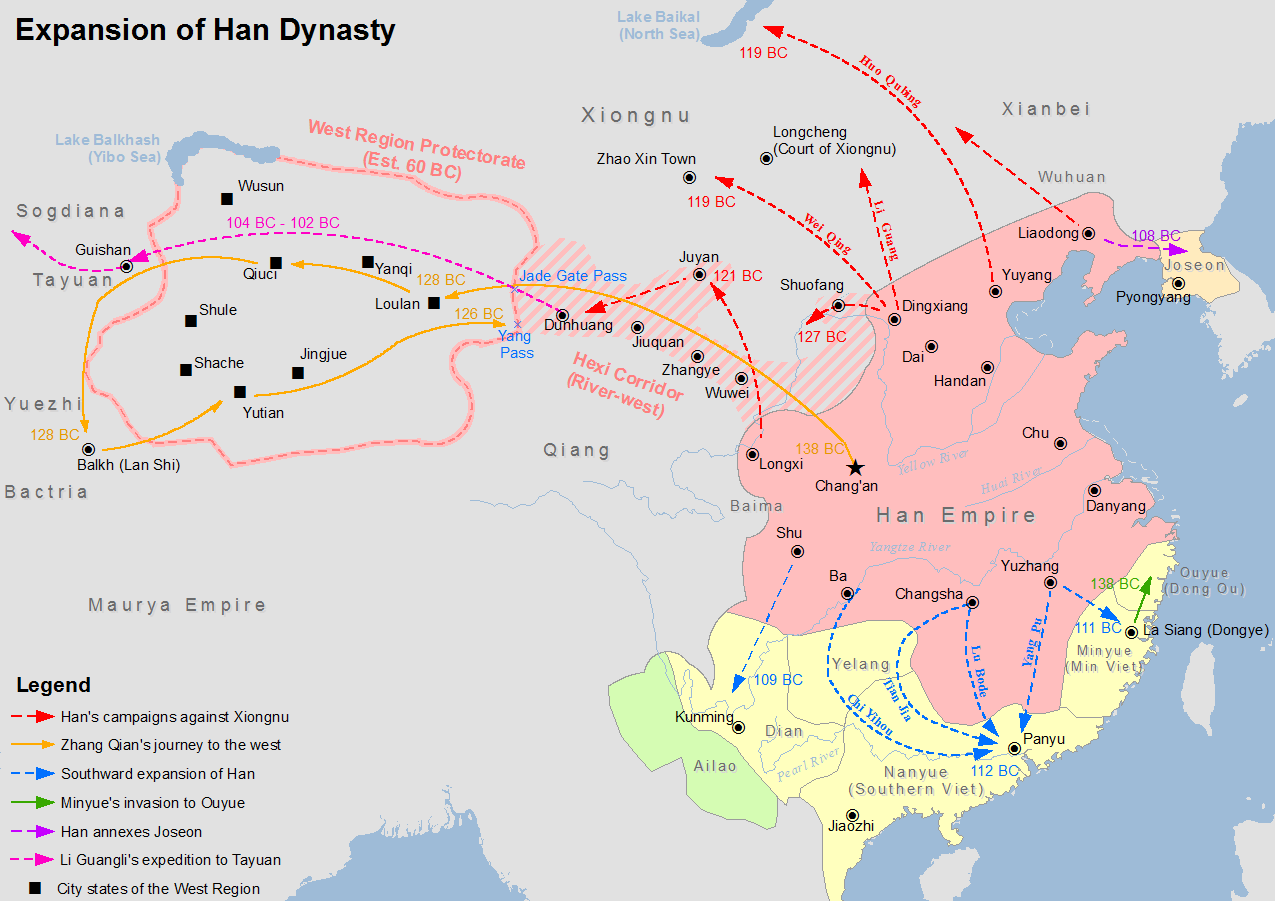Map showing the expansion of the Han dynasty in 2nd C. BCE
“A treaty was again signed, and a market was opened at the barrier. Presents were forwarded to the Hsiung-nu, and an imperial princess was sent to cement the alliance with the Shen-yu. The treaty was tolerably well observed throughout the reign of King-te; towards the close there were some petty incursions on the borders, though there was no serious raid.” Mentioned previously, although assaults still happened near the walls between the two societies, tensions between the two sides did eventually calm down and an alliance was considered. This could all however, just be machination constructed by the Chinese in order to turn the tide of power towards their side, as from the outside looking in, they were arguably the more superior power in this situation. This could prove itself to be true, as after the Emperor Wudi took the reign, the Chinese would go on to make alliances with neighboring kingdoms and nations in order to help with the Sino-Xiongnu war. Consequentially, despite a marriage treaty being signed between the Xiongnu and the Han Dynasty in order to prevent further raids committed by the nomadic tribe resulting in a better relationship between the two nations, this all fell apart after Emperor Wudi’s reign started and proclaimed the start of a war against the Xiongnu.
The Chinese had plans to go to war with the tribe, but because the previous Emperor, Gao of Han, realized the nation was still vulnerable to attacks by the Xiongnu. As a result of this, he came up with the idea for the Chinese to start preparing a full-scale war against the Xiongnu people in secret, all the while covering it up by easing the tension and hostility by signing a marriage treaty with the nomads. But after Emperor Wudi came into power, the policy of peace between the Xiongnu and the Han Dynasty ended, as China began to form allies with neighboring tribes and started the Sino-Xiongnu war. “After the death of K'ien, the Hsiung- nu heard of China's relations with Wusun, at which they became angry and wished to make war on it.” As higher-ups of the Xiongnu tribe got the news that China had broken the treaty of truce, started forming alliances, and became more aggressive with their attacks and raids as the war had been declared on them by the Chinese. “From that time the treaty was abandoned by the Hsiung-nu, who attacked the stockades on the high road, and were constantly committing acts of brigandage on the border, too numerous to mention.” As said before, the intensity in which the Xiongnu began to terrorize Chinese land increase, with their raids and attacks on the Han becoming more brutal and disturbing. One of the main reasons for the increased brutality may be due to the way the Chinese backstabbed the Xiongnu by breaking the treaty, but nonetheless the brutality without a doubt contributed to the worsening of the relationship between the two sides, reverting the developing ally’s status that previous emperors had been building. Thus, due to military tensions between the two sides began to start rising again after the reign of Emperor Wudi began, the relationship between the Han Empire and Xiongnu tribe had gone from potential allies to enemies, as the actions of Emperor Wudi breaking the marriage diplomacy both sides had and reverting the process of having a potential alliance..."
-Jiaan Tan, The Development of the Han-Xiongnu Relationship over the Reign of Emperor Wudi. Chiway Repton Xiamen School, Xiamen, China.
 |
| Map showing the expansion of the Han dynasty in 2nd C. BCE. |
Source:
Quote:


Comments
Post a Comment